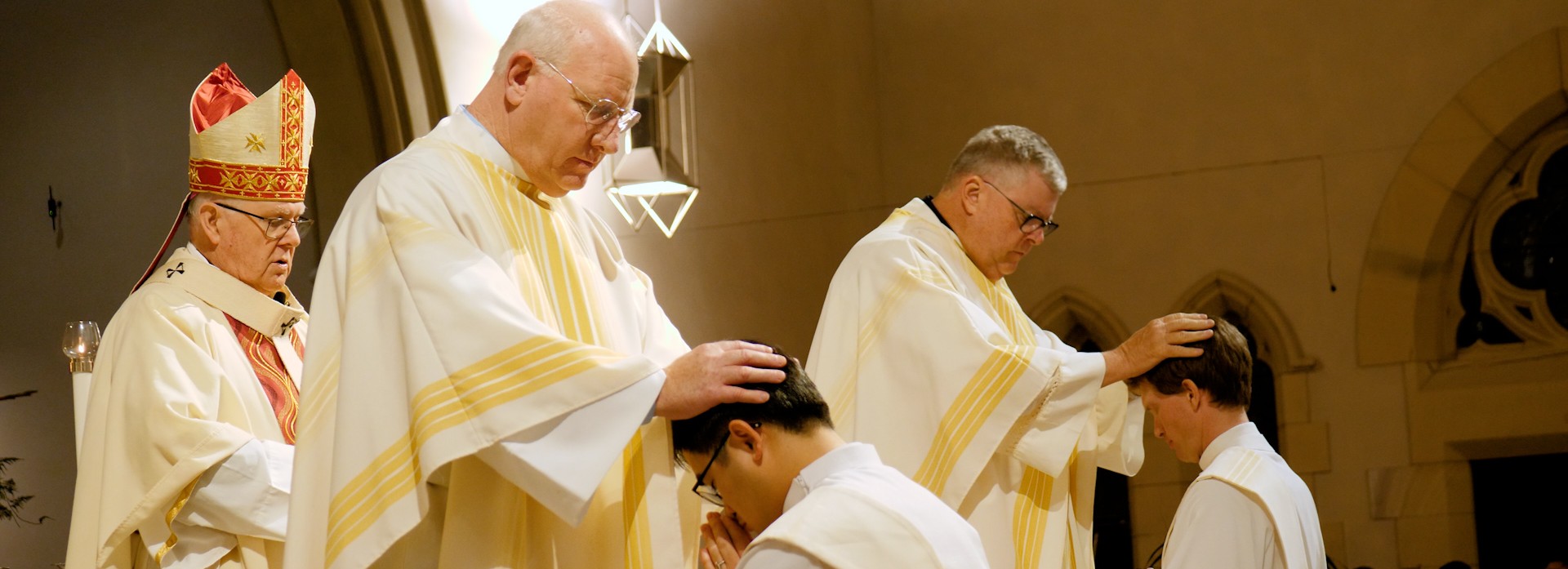Holy Orders
National Liturgical Council

The re-discovery, since the Second Vatican Council, of the importance and significance of Baptism and the ministry of all the baptised, has thrown new light on the understanding of ordained ministry in the Catholic Church. A major thrust of the Council was the notion of servant-leadership for all who undertake any ministry, but especially for those called to serve as deacons, presbyters or bishops. The understanding from the Council of the Church as the People of God has thrown new light on the relationship that exists between the ordained and those they are called to lead and serve. An important aspect that has emerged is that the ordained also belong to the People of God and as such are not over or above the people but one with them in a spirit of genuine cooperation and loving service.
The Sacrament of Holy Orders, then, is that sacrament by which some are called to a particular role of service in the life of the Church. Holy Orders is characterised by a ministry of preaching, teaching, sacramental ministry and pastoral activity. The ancient three-fold dimension of ordained ministry - Bishop, Priest, Deacon - exists in the Church for the service and sanctification of God’s people. Each individual ministry comes under the banner of Holy Orders and is identified by certain particular functions and charisms.
The ministry of the Bishop, who possesses the fullness of the priesthood, is understood in the light of the ministry and mission of Christ as teacher, sanctifier and leader. By virtue of episcopal ordination which comes directly from Christ, the bishop’s primary task of preaching the Gospel is manifested by his responsibility to sanctify, to teach and to govern. As successors of the apostles and shepherds of the flock, bishops have the responsibility of fostering concord and unity among the priests and people committed to their care. All bishops have a relationship to each other in the so called college of bishops and the bishop himself also has a collegial relationship with his priests in his diocese. As true and authentic teachers of the faith, bishops exercise their authority in communion with the Supreme Pontiff, the Pope, as they exercise their episcopal ministry for the building up of Christ’s body, the Church.
Presbyters or Priests, as ministers of Christ and acting in the name and the person of Christ, are co-workers of the bishop. A principal function of priestly ministry is preaching the Word together with the celebration of the Eucharist and the other sacraments as well as the pastoring of the People of God. The priest, in the course of his daily life, mirrors the ministry of Jesus himself and in so doing helps the People of God to appreciate more and more their share in Christ’s priesthood. Like the bishop, the priest also shares in the three-fold ministry of teaching, sanctifying and leading. The basis for priestly ministry, as for the bishop, is the ministry of Jesus himself.
Deacons, unlike bishops and presbyters, are not ordained to the priesthood but rather to the ministry of altar and charity. Deacons assist the bishop and the priest at the altar by proclaiming the Gospel, preparing the altar for the celebration of the Eucharist and distributing the blood of Christ. They are also charged with leading public prayer, baptising and witnessing marriages. The ministry of the deacon, though, extends beyond the sanctuary to the world through works of charity and service. Many dioceses around the world now have permanent deacons, more often married men who have been called to public ministry in the Church. As such, they share in the Sacrament of Holy Orders as do those transitional deacons for whom diaconal ordination is a final step towards the priesthood.
All ministry in the Church is bestowed by Christ and carried out in his name, he who came not to be served but to serve.
